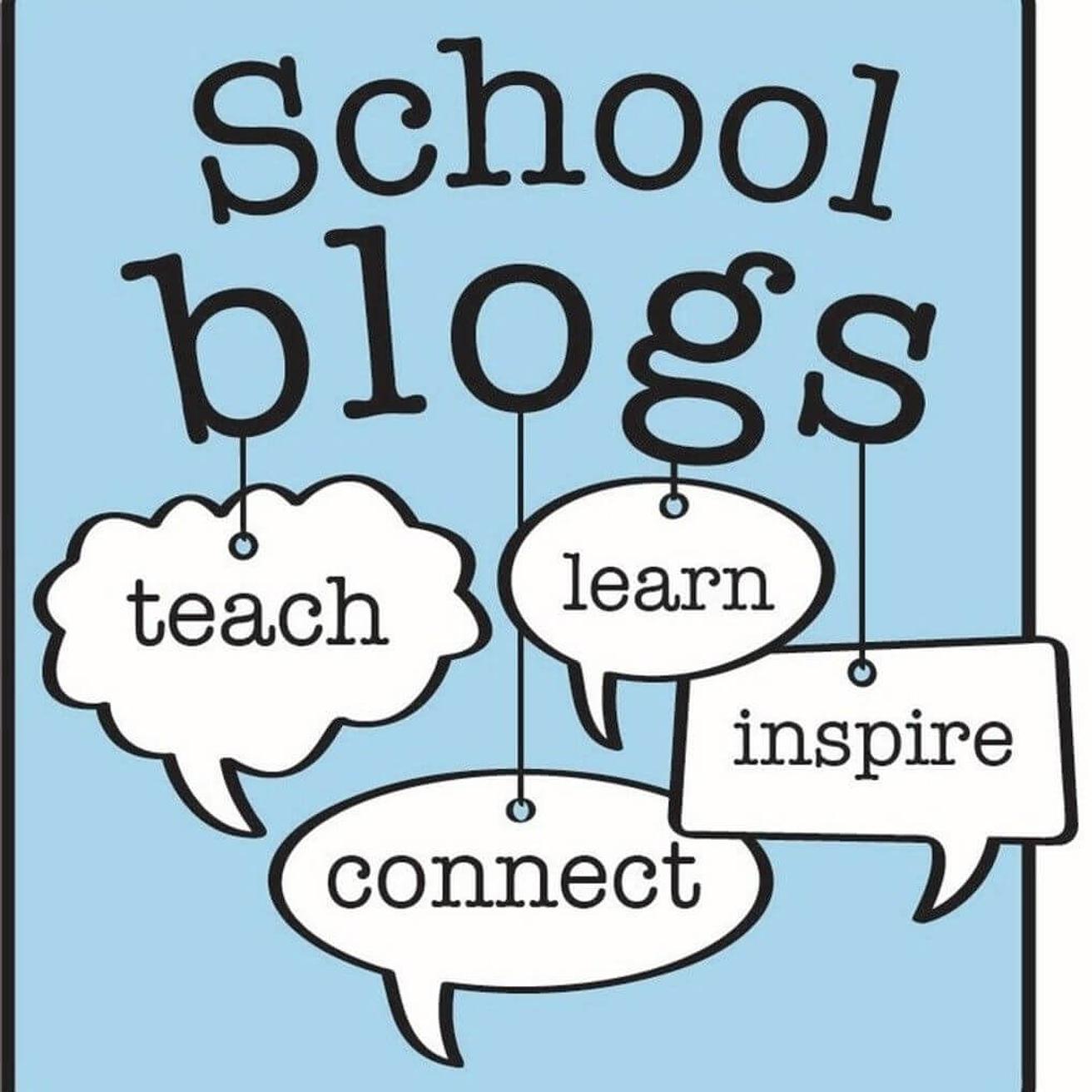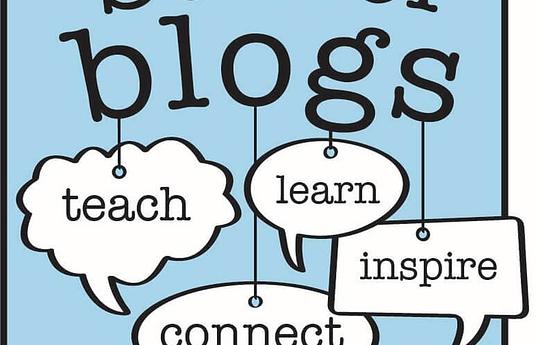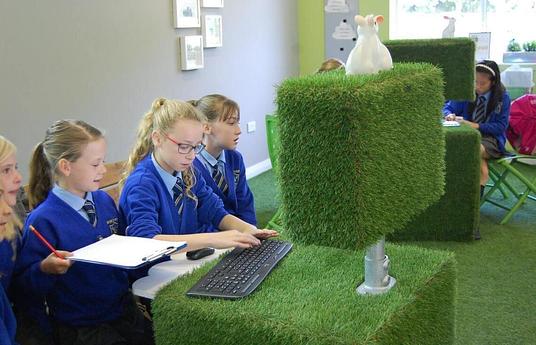Lisa Gottfried teaches Digital Media and Andrew Biggs teaches Psychology, Civics, and Economics, both at the flagship New Technology High School in Napa, California. They spoke with us about their innovative use of blog portfolios at the school and why being tech literate is vital for young people today.
LG: What we’ve created is a way for students to create a blog portfolio which is a little different than an online portfolio, in that it’s much more flexible, it’s more shareable, it’s a way for students to document their work over a period of time and to reflect on their work. But also to teach other students and other adults what they’ve learned, to make real connections, and write for an authentic audience.
AB: Our students are on social media anyway and the current market requires people to have a presence. We might as well take advantage to educate students on how they can make use of both of those things. Many of us may assume that they’re already skilled in social media but without guidance sometimes that’s a struggle.
Why is it important to bring technology to schools?
LG: Tech is just a tool so we’re just giving them fancy pencils in a way, but it can also be combined with really good pedagogy so it’s not just a fancy pencil, it helps students to go deeper or helps them to collaborate and get a new perspective that they wouldn’t normally get.
Technology is infused in everything we do at New Tech High and has been from the very beginning of our school. So they are able to set up documents that they can collaborate with twenty other people, they are able to send emails and use social media and Snapchat and all the things they use in order to stay in touch with one another, that’s all an important part of our society and it’s becoming more and more important as we move forward.
AB: I would agree with your point that it seems like a lot of the folks that are using digital tools are using them largely as tools through which students can consume, but really the ways that technologies are changing our society is the ways they help us to stay organized, to create content, to reimagine and reinterpret the ways things need to be presented and really again we would be doing our students a disservice if we weren’t preparing them for what they would need to be as professionals. Our job is to make sure that they’re ready for whatever's coming and if we know that something's missing, then we’re not doing our job.
LG: There’s this assumption that digital natives know all of this stuff and they don’t. They don’t know, so asking them to make their own logo, asking them to do a video, asking them to make a blog post, they might know Snapchat really well but they don't know those other things, but we assume that they do. So it’s really important that we teach them explicitly.
AB: And even then, the way they use Snapchat isn't necessarily the best way it could be used for personal branding
LG: Or professional reasons!
Why is tech literacy so important for the next generation?
LG: As the world changes it’s so clear that if you’re not on the technology bandwagon you will be left behind. We’re seeing technological gaps where there's’ poverty and no access to technology, so I think it can be the great leveler of the playing field if students can have access to that technology.
I have students who are immediately marketable and making really good money doing the things that we’re teaching right in the classroom. I always say to them if you can’t go out and get a job from this to put yourself through college, or even put yourself through high school, then I’m doing my job wrong. I want this to be a really authentic learning experience so that you could go out and be an incredibly marketable person and that involves everything from learning really cool programs to learning the process by which you think through a concept. How does high tech industry actually accomplish the things that they accomplish? If you can use that terminology and hold your own with adults who are doing this kind of work, which is what happens when we teach technology and the vocabulary and thinking that goes with it, then it’s really incredible, those kids get snatched up immediately in high tech companies which is what we want.
AB: The world of business and entrepreneurialism have done a really great job of leveraging all the different resources that are available on social media, to be able to promote, to share what's out there, to gain information, to brand yourself. Really this entrepreneurial thinking is the way in which the coming economy needs actors to behave and we would really be doing students a great disservice if we didn't help them to start thinking about what that looks like so they can be effective actors and changemakers in the economy that’s ready for them.
LG: And the truth is when you go for jobs now the first thing they ask is what is your website URL so that we can see your body of work. So if we’re not teaching them to have a body of work., or getting them to create their own body of work, then they’re ill-prepared for what’s coming in the near future, what’s here now. Who knows what they’re going to be required of as things change so rapidly but at least they're flexible, they’re used to change, they know where they need to go to learn new information and new technologies. That’s more of what we’re preparing them for is how do you handle this rapid change that’s coming.
How has tech literacy had an impact on a student’s life, in your experience?
LG: Just last week I bumped into a New Tech High graduate who was so excited to see me – "Oh Mrs Gottfried, you’ll never guess what I’m doing now that I’m in college!" She had me in 9th grade so it was four years since I’d taught her and she was so excited to tell me, "I’m using illustrator and photoshop in the job I’m doing now and I barely know what I’m doing, but I know what to do so that I can learn and I'm making great money at it!"
Ultimately, I think it’s those kinds of stories about students who are creating content out there in all areas, dental hygienists, lawyers, she’s working in a political field, but those basics that we taught about how to use certain technological skills can be used across any industry. So its really neat to see students just flourishing and having a good time with it.
AB: I teach largely 12th graders that leave me and go off to college or career, whatever they do, and there have been numerous examples of students that really felt like they weren't the powerhouses of the groups they worked in or felt like they really struggled with some of the skills we try to help them build, but once they’re off in college or career they find themselves telling us how suddenly they’re the leaders of these groups because all the other folks they’re working with were ill-prepared for what they thought would be the norm. They’re finding that they have all of these skills in technology that they can use for project management and they have the skillsets and language at their fingertips to know how to talk to teams and encourage and make progress and those kinds of things. It’s great to see some of these students who felt like they didn’t have these skill sets really start processing a lot of these things they have at their disposal and soft skills that a lot of the time our society doesn’t spend a lot of fo time talking about or honoring.
LG: We have students that were required to take four college classes while they’re in high school and we have kids that have gone onto communication classes or speech and debate classes and they’re surprised that as 9th and 10th graders they’re up against college kids and they’re the best in the class! They’re the best prepared, they’re the ones willing to get up and speak, they just know what needs to be done and they kind of astonish the professors at colleges that they’re much more prepared than a lot of people who are two, three, five years older than them, so it’s kind of exciting to see!
What is the biggest challenge facing education right now?
LG: We talk a lot about students really educating them for their future and not our past. So really understanding what skills they need moving into the future, we’re really moving into what they call a "gig" society, where you have to be able to collaborate on short projects or on culminating projects, you need to be able to speak well, you need to be able to write well, you need to be able to do a variety of things and you have to have a sense of self-agency and I think that’s going to be a huge thing. Much more of an entrepreneurial spirit that we’re trying to teach, how to be out in the world and promote themselves in unusual ways.
AB: Education has a real struggle with doing things the way they’ve always been done, as opposed to really being thoughtful about how things need to be done now. There's a real presence of emphasis on content when we live in a world in which any piece of information can be found very easily. What our students need now is more about how to find information rather than simply memorize it.
LG: Also the processes it takes to get from point A to Point B. Do they know how to project manage? Do they know about design thinking? Can they implement something from beginning to end? I think that’s a really important thing that kids need to know as they move into the future.
The next 100 years of education should…
LG: The next 100 years of education should break down the walls of the classroom and be customizable and allow students to take any direction that they’re interested in, allow them to access experts and imagine a more global community and how we all are interconnected. I think 100 years is a long time to consider given how quickly things have moved, even in the last two or three years, but I think connection is really important and customization of education.
AB: The next 100 years of education should change the role of the teacher from the gatekeeper of knowledge to facilitator of experiences. Our economy is going to be more about skills and their ability to manoeuver difficult situations and situations that no-one has ever encountered before, the next generation will face problems that nobody has ever faced. So I think it's important that teachers lose this identity of founts of knowledge and instead become people that are more familiar with just what it takes to learn and the experiences and processes necessary to really experience what life is like and build situations that are safe, so that students can practise these skills so once they’re on their own they can feel empowered and have a baseline of what makes them successful and what doesn’t.
Find out more about the benefits of Blog Portfolios and how to get started using them by checking out the innovation page.


